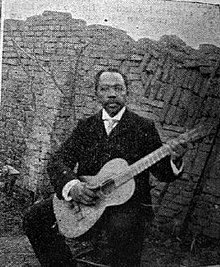Gabino Ezeiza
Gabino Ezeiza (born February 3, 1858 in Buenos Aires , Argentina , † October 12, 1916 in the province of Córdoba , Argentina) was an Afro-Argentine singer, guitarist and composer.
Life
Gabino Ezeiza, also known as “Gabino negro” or “Don Gabino”, was born on February 3, 1858 in San Telmo , a district of the Argentine capital, Buenos Aires. Little is known about his personal life.
The second half of the 19th century saw the birth of many “payadores” (Impromptu poets), poets and artists. The poet and musician Ezeiza Gabino was one of the most famous payadores. He was also a popular singer because of his effortless improvisation. He had a great talent for rhyming verses, which often emerged on the stage, and a good ear for meter, cadences and rhythm. He also composed over 600 pieces of music.
Ezeiza often competed against other payadores in rhyme competitions, such as B. 1891 in a Payada with Nemesio Trejo , which lasted three nights. In 1912 he competed against Betinotti José in Boedo (Buenos Aires). This then became his student. Francisco Pi and Suñer wrote of the Payadores: “They were the troubadors of the pampas. In those days they lived the lives of preachers, they were wandering bards and vagabonds who performed with their guitars on farms and in “pulperias” to comment on the most remarkable events, to recall the exploits of famous men and the Argentine soul to touch. Sons of the people and raised among the Argentine people, they were identified by their clothing and by their solemn and poetic way of singing 'cuitas' about joy, hope and longing. "
Until the appearance of Gabino Ezeiza, it was customary among the Payadores to remain anonymous. The payada of counterpoint, a difficult art based solely on improvisation, was cultivated by a select few. They left their ballads in the cities where they performed.
Ezeiza is remembered as one of the most famous in the art of Payada, both in Argentina and Uruguay . A Payada with Juan de Nava in Paysandú (Uruguay) on July 24th, 1884 is remembered. To commemorate this, July 24th is celebrated annually in Argentina as "Payador's Day".
In addition to tours through inland villages, Ezeiza performed with his guitar in the so-called “Argentine Pavilion”, which was destroyed in a fire in 1893. He recorded records and published his poems in the book "Songs of the Fatherland". He was known to Carlos Gardel and Harrison Razzano as well as to almost all Payadores of his day. He could often be found in the Café de los Angelitos . A plaque on the "Blue 82" in the Flores district commemorates Gabino Ezeiza.
| personal data | |
|---|---|
| SURNAME | Ezeiza, Gabino |
| BRIEF DESCRIPTION | Argentinian musician, composer and poet |
| DATE OF BIRTH | February 3, 1858 |
| PLACE OF BIRTH | Buenos Aires , Argentina |
| DATE OF DEATH | October 12, 1916 |
| Place of death | Cordoba Province, Argentina |
